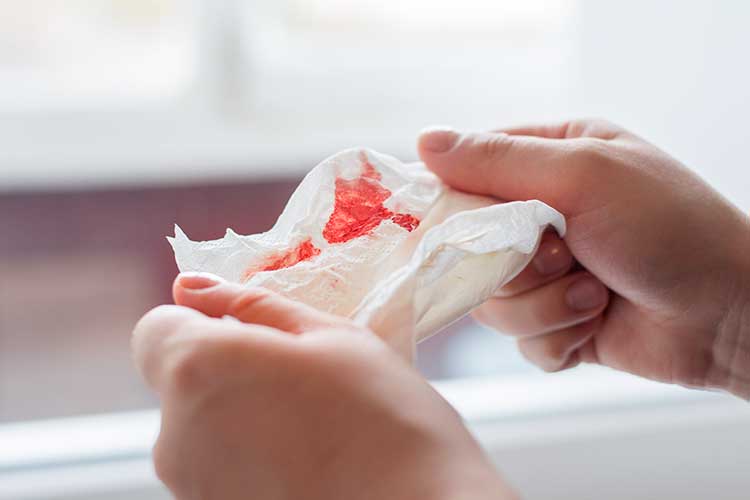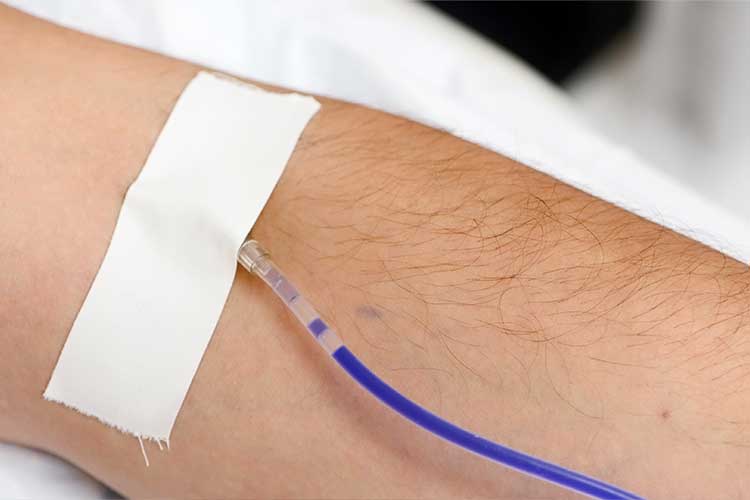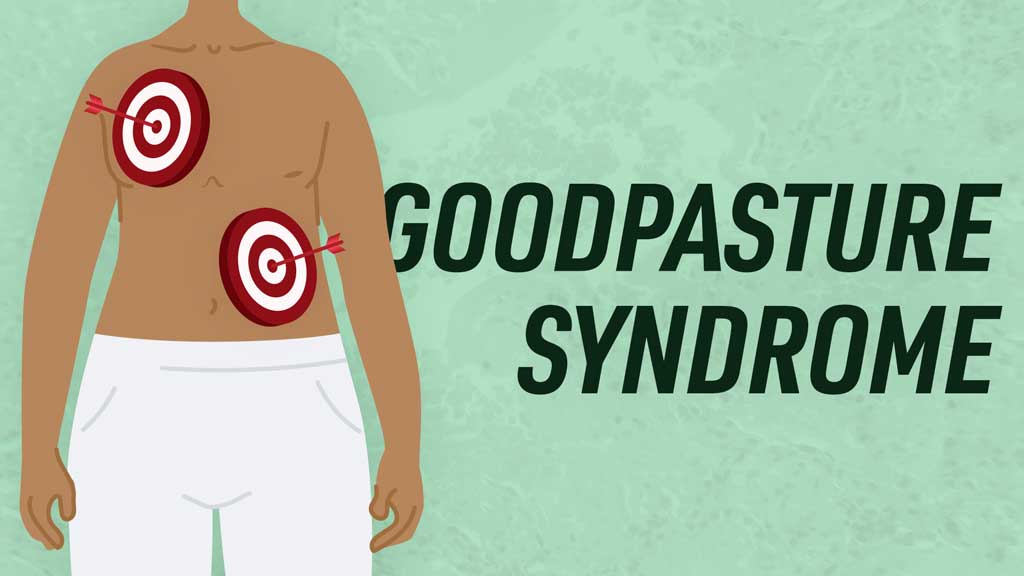Goodpasture syndrome is a rare but potentially deadly disorder that affects about 0.5 to 1.8 people per 1 million every year (Rout & DeVrieze 2024).
Recognising the symptoms of Goodpasture syndrome and escalating care immediately is crucial in preventing fatality (Rout & DeVrieze 2024).
What is Goodpasture Syndrome?
Goodpasture syndrome, which may also be referred to as anti-glomerular basement membrane (anti-GBM) disease, is a potentially life-threatening autoimmune disorder where the body produces antibodies that attack the lining of the lungs and kidneys (Rout & DeVrieze 2024; NKF 2024).
The disorder is characterised by:
- The presence of anti-GBM antibodies, with
- Pulmonary alveolar haemorrhage (bleeding in the lungs), and/or
- Glomerulonephritis (kidney inflammation).
(GARD 2025; NKF 2024; Lee 2023)
Without prompt treatment, symptoms can progress rapidly, leading to life-threatening bleeding in the lungs, renal failure and potentially death (Story 2018; NKF 2024).

What Causes Goodpasture Syndrome?
It’s unknown exactly what causes anti-GBM antibodies to develop, but they’re thought to be triggered by an environmental insult in a person with a pre-existing genetic susceptibility (GARD 2025).
Once anti-GBM antibodies are produced, they attack the collagen present in the alveoli and capillaries in the lungs, and/or the glomerulus (filtering units in the kidneys), causing bleeding in the lungs and inflammation in the kidneys (GARD 2025).
Potential environmental triggers include:
- Certain medicines (e.g. alemtuzumab)
- Cocaine inhalation
- Certain infections (e.g. influenza A2)
- Smoking
- Exposure to metal dust, organic solvents or hydrocarbons
- Extracorporeal shock wave lithotripsy (which is used to treat kidney stones).
(Rout & DeVrieze 2024; NKF 2025)
Those who have a genetic predisposition to the creation of anti-GBM antibodies appear to have specific human leukocyte antigen (HLA) subtypes (Rout & DeVrieze 2024).
Symptoms of Goodpasture Syndrome
Symptoms may include:
- Haemoptysis (coughing up blood)
- Cough
- Respiratory impairment
- Anaemia
- Joint pain
- Arthritis
- Chest pain
- Glomerulopathy
- Muscle pain
- Retention of baby teeth
- Purpura
- Renal insufficiency
- Retinal detachment
- Drug-induced vasculitis
- Oedema
- Hypertension
- Enlarged liver and spleen
- Cyanosis.
(GARD 2025; Rout & DeVrieze 2024)
Diagnosing Goodpasture Syndrome
A diagnosis is made upon the presentation of:
- Bleeding in the lungs, which can be detected via chest X-ray and lung biopsy, or bronchoscopy with fluid wash out
- Urinary symptoms (e.g. blood and/or protein in the urine), which can be detected via blood and urine tests
- Circulating anti-GBM antibodies, which can be detected via kidney biopsy.
(NKF 2024; Lee 2023)
There are several differential diagnoses that may need to be ruled out, including:
- Granulomatosis with polyangiitis
- Eosinophilic granulomatosis with polyangiitis (Churg-Strauss syndrome)
- Pneumocystis jiroveci pneumonia
- Respiratory failure
- Rheumatoid arthritis
- Systemic lupus erythematosus
- Microscopic polyangiitis
- Rheumatoid arthritis
- IgA-mediated disorders
- Acute glomerulonephritis
- Community-acquired pneumonia
- Cryoglobulinaemia
- Undifferentiated connective tissue disease
- Endocarditis
- Drug-induced vasculitis
- Alport syndrome.
(Rout & DeVrieze 2024; Kathuria 2023)
Treatment For Goodpasture Syndrome

Patients will often present critically ill and will require immediate haemodialysis, along with intubation in the case of respiratory failure. At this stage, a kidney biopsy may also be taken to confirm the diagnosis (Rout & DeVrieze 2024).
The primary goals of treatment are to:
- Quickly remove anti-GBM antibodies via daily plasmapheresis - a procedure wherein blood cells are separated from the plasma (which contains the anti-GBM antibodies), and the plasma is replaced with another solution, or treated and returned back to the body
- Prevent the body from creating more anti-GBM antibodies by administering immunosuppressive medicines
- Remove any environmental irritants that may have triggered the production of anti-GBM antibodies, e.g. via smoking cessation, or changing jobs if the patient is occupationally exposed to hydrocarbon.
(Kathuria 2023; Rout & DeVrieze 2024; Heitz 2018)
Patients may also require supportive care such as oxygen administration, mechanical ventilation and/or blood transfusion (Lee 2023).
If renal failure occurs, the patient will require dialysis or a kidney transplant (NKF 2024).
Post-discharge, the patient will need to continue treatment. Plasmapheresis is generally performed daily until anti-GBM antibodies are undetectable, and immunosuppressive therapy will continue for a further three to six months after cessation of plasmapheresis. Renal function will also be monitored long-term (Rout & DeVrieze 2024).
Overall, the five-year survival rate of Goodpasture syndrome is over 80%, however, it’s crucial that treatment is commenced immediately, as delays may lead to fatality (Kathuria 2023; Rout & DeVrieze 2024).
Test Your Knowledge
Question 1 of 3
What is the five-year survival rate for Goodpasture syndrome if treated promptly?
Topics
References
- Genetic and Rare Diseases Information Center 2025, Anti-glomerular Basement Membrane Disease, U.S. Department of Health & Human Services, viewed 26 March 2025, https://rarediseases.info.nih.gov/diseases/2551/goodpasture-syndrome
- Heitz, D 2018, 'Plasmapheresis: What to Expect', Healthline, 3 September, viewed 26 March 2025, https://www.healthline.com/health/plasmapheresis
- Kathuria, P 2023, Goodpasture Syndrome, Medscape, viewed 26 March 2025, https://emedicine.medscape.com/article/240556-overview
- Lee, J 2023, Goodpasture Syndrome, MSD Manual, viewed 26 March 2025, https://www.msdmanuals.com/en-au/home/lung-and-airway-disorders/autoimmune-disorders-of-the-lungs/goodpasture-syndrome
- National Kidney Foundation 2024, Goodpasture Syndrome, NKF, viewed 26 March 2025, https://www.kidney.org/atoz/content/goodpasture
- National Kidney Foundation 2025, Kidney Stone Treatment: Shock Wave Lithotripsy, NKF, viewed 26 March 2025, https://www.kidney.org/atoz/content/kidneystones_shockwave
- Rout, P & DeVrieze, BW 2024, ‘Goodpasture Syndrome’, StatPearls, viewed 26 March 2025, https://www.ncbi.nlm.nih.gov/books/NBK459291/
- Story, CM 2018, ‘Goodpasture Syndrome, Healthline, 13 November, viewed 22 March 2022, https://www.healthline.com/health/goodpasture-syndrome

